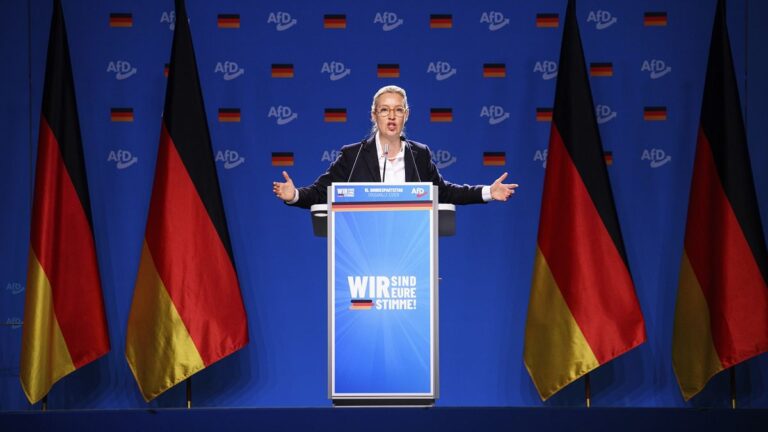This group will be the most radical in the half-cycle and is likely to be shut down by mainstream forces.
advertisement
Just days after Prime Minister Viktor Orbán’s “Patriots for Europe” was born, the European Parliament may soon have another far-right group fiercely opposed to the Green Deal, immigration and European integration.
According to a parliamentary source who spoke to Euronews on condition of anonymity, the group could include parties such as Germany’s Alternative for Germany (AfD), Poland’s Labor Party and Spain’s Se Acabvo la Fiesta (SALF), as well as several lawmakers from Greece and Bulgaria.
None of these far-right forces currently belong to any of the seven existing political groups in the European Parliament.
The Czech Party for Liberal Direct Democracy (SPD) could also join. The party’s president, Tomio Okamura, said the new group would be called “Europe of Sovereign States” and would be formally announced in Brussels on Wednesday. He confirmed the SPD and AfD would join but did not say which other parties might join.
With 15 MEPs, the AfD would have the lead.
“We took advantage of the offer that was favorable for us,” Okamura said at a press conference in Prague, according to local media.
“This plan is based on ideology. It clearly states that it is against the Green Deal and against immigration, but also against the Islamisation of Europe. We want to see the powers of Brussels returned to the national level.”
To form a group in the European Parliament, a minimum of 23 MEPs from at least seven member states are needed, meaning the SPD and AfD would need delegations from five more countries.
Konfederacja, a strongly anti-LGBT, anti-feminist and anti-abortion Polish coalition, seems like a suitable candidate, but its six MEPs belong to three different parties and it is unclear whether they will all join.
Spain’s Se Acabó la Fiesta (SALF), a self-described “anti-establishment” party led by social media strongman Alvise Pérez, could field three more lawmakers.
SOS Romania could also join the group due to its ultranationalist and eurosceptic views, but the AfD opposes its integration.
“I spoke with representatives of SOS and we unanimously decided not to accept them into the group. I don’t want to discuss the reasons for the refusal,” AfD MEP Kristin Andresson said last month.
Concerns are centred on Diana Iovanovich Shosoaka, a newly elected MEP from SOS Romania, who has been criticised for her close ties with Russia, a party source told Euronews Romania. Last year, Ukraine announced sanctions against her after she suggested that southern Ukrainian territories should belong to Romania.
But the AfD is also vulnerable to these allegations, as a large proportion of its members are accused of spreading a pro-Kremlin rhetoric and benefiting from Russian funding.
Other potential members include Bulgaria’s Revival, Greece’s NIKI and France’s Reconquête!, which has one MEP without affiliation after an internal split.
The formation of the “Sovereignty” group had been the subject of speculation since the AfD was expelled from the now-disbanded Identity and Democracy (ID) group after its then-leader, Maximilian Klar, made controversial comments to an Italian newspaper saying not all members of Nazi elite SS units were war criminals. Separately, Klar’s offices were searched after his assistant was arrested on suspicion of spying for Chinese intelligence.
“They (AfD) have solved the issue of Max Klar. He will not even be a member of the delegation,” Okamura said.
If approved, “Sovereign Europe” would become the most radical right-wing force of a half-cycle and would be immediately cordoned off with a quarantine cordon by mainstream forces.

